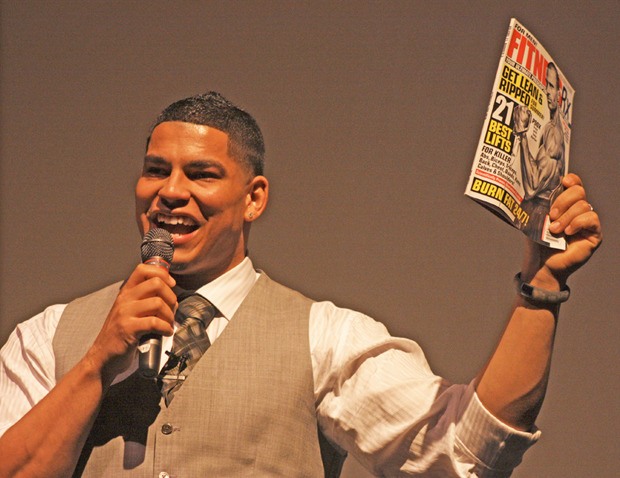The youth pastor and veteran NFL fullback raised the fitness magazine for all to see.
Such cover images of chisled, ripped bodybuilders, Eddie Williams warned his young audience at Auburn High School, send the wrong message to growing, impressionable teens. And those quick, even drastic methods for reaching physical greatness are chock full of lies.
There are safer, more practical approaches to ensuring a healthy lifestyle, he emphasized. Like eating right, making the right choices and being accountable for who you are, he said.
“Take responsibility for what you’re doing,” Williams told the students at the Performing Arts Center during the school’s DECA event on good health, Trojans Take Charge, last Friday. “You need effort and control … but you need to believe in yourself. Don’t be a victim of the culture.”
Getting lean and mean doesn’t come from a magazine, Williams said. There are no fast, weight-shedding solutions or 30-day, muscle-maxing methods that can do a body good. The media perpetuates myths about fitness and nutrition.
Pacing the stage, Williams preached a message different from the sermons he routinely delivers at his Christian fellowship in Covington. Williams, a 245-pound fullback for the Cleveland Browns and a former Seahawk, tours the country, spreading the gospel of good health to schools, organizations and churches.
Among his topics — faith, leadership, motivation, health and nutrition, drug/alcohol prevention, bullying, teen violence and the consequences of fatherlessness.
“My goal is to help create awareness about the importance of health, be it physically, mentally and also spiritually, especially amongst our young people,” said Williams.
Williams, who lives in the Seattle area, is pursuing his master’s in divinity.
For teens, getting healthy and staying that way begins with the power of knowledge, he said. Teens should be more aware of what they eat.
Check everything.
“(At a store) I walked up the cereal aisle and I saw something called Fruity Pebbles, which is good, right? Williams told the audience. “But Fruity Pebbles has no fruit. … all you get is the sugar.
“I want you to change what you are doing. I want you to change your lives, change the way you think, the way you analyze, change the way you discern things, because it’s about doing the right things.”
Under advisor Lori Jacobs, Auburn High School’s award-winning DECA program has joined the crusade through a campaign and health fair.
Two students, Curtis Kavog and Adam Luk, took things a step further, producing a clever video, “Food I Don’t Like”, which took third place in the Hunt 4 Health High School Video Challenge. The school received $3,000 from LifeWise Health Plan of Washington to benefit its nutrition and physical activity programs.
DECA and Auburn are pitching in.
According to King County Public Health Data Watch, Auburn, where one in five youth are overweight or obese, ranks among the county’s most obese cities. The study also showed that rates were highest among males, youth of color and those in South King County. Further studies have shown that youth obesity can lead to high blood pressure, high cholesterol, insulin resistance and breathing and joint problems.
To bring his message home, Williams shared the story of his mother. She struggled with obesity throughout her life, he said, but unable to overcome “the psychological crutch” of overeating, she developed diabetes and finally cancer before her death in 2001.
“The doctors told her that ‘if you could just lose some weight, we might be able to better operate on you … remove your tumors,'” Williams said. “Doctors said ‘if you lose some weight, we might be able to save you.’ But the psychological toll on her brain did not let her see that. And because she had cancer, she ate more. … Eventually the doctor told her ‘there’s nothing we can do for you.’
“This is all about giving yourself the best chance at life.”
Before he left the stage, Williams flung this challenge at his young audience.
“You have a decision to make. (You can have) the pain and the discipline to experience getting healthy that provides you with an excellent life, or you can be comfortable,” he said. “One result is your best chance at life, the other one doesn’t. That’s the big idea. You can take charge of your life, or your life will take charge of you.”
Talk to us
Please share your story tips by emailing editor@kentreporter.com.
To share your opinion for publication, submit a letter through our website https://www.kentreporter.com/submit-letter/. Include your name, address and daytime phone number. (We’ll only publish your name and hometown.) Please keep letters to 300 words or less.

